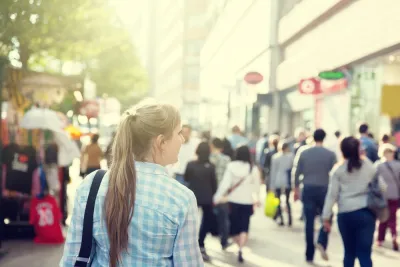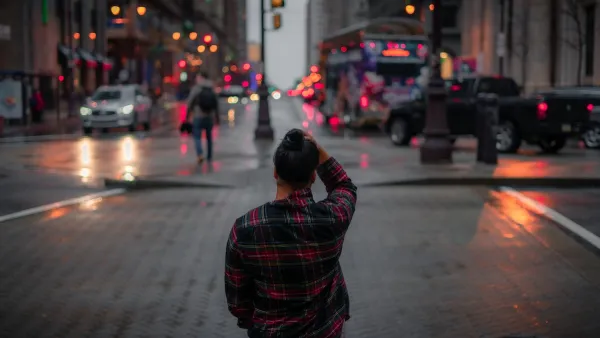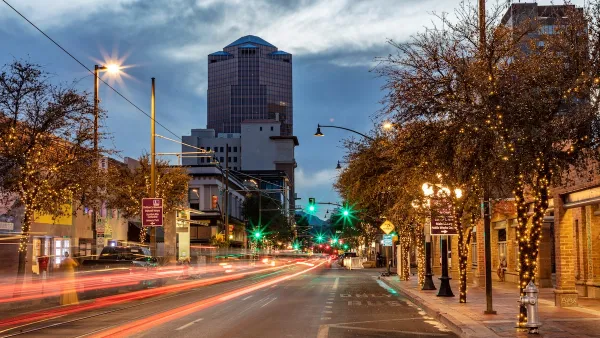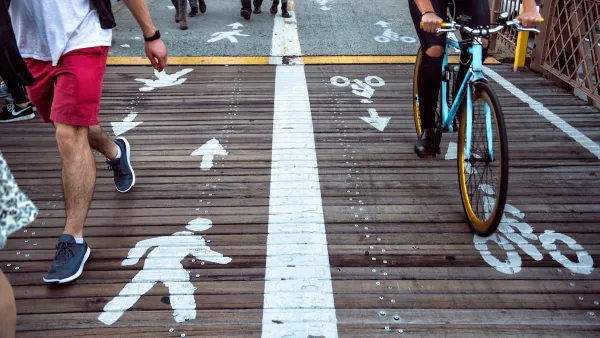An opinion piece highlights the benefits of slow transportation, a luxury seldom available in our speed-obsessed society.

Describing the occasional ritual of walking from work to meet up with friends for post-work drinks, Streetsblog’s Kea Wilson writes that “I enjoy it infinitely more than any trip I take in a car.” Wilson asks the reader to appreciate the joys of slow transportation in a fast-moving world. “American culture, and particularly American transportation culture, is profoundly rooted in the idea that traveling fast is best — because if we don’t, that culture insists, we won’t be able to make or spend money efficiently enough to retain our position as a global economic superpower.”
Wilson understands why many Americans don’t value slowness. “So much of the slowness we experience when we walk, or bike, or take transit in the U.S. is not the kind of glorious, romantic diversions rhapsodized about by 18th-century flâneurs with deep pockets and nowhere to be.” It is, most likely, a miserable wait for a bus that never comes, a longer-than-expected trip for a few basic necessities, or being late to work through no fault of your own.
Wilson contrasts this with “chosen slowness,” which can help regulate your nervous system by giving you time to unwind during an open-air walk or bike ride, for example. “It’s the pleasure of movement itself, in a society that would probably teleport us all directly to the places where we work or consume, if we could just find a way to make teleportation profitable.” Wilson admits this is a privilege few can afford.
Ultimately, Wilson argues that the American obsession with speed skews toward consumption. “A fast bus — or a fast train, or a protected bike path that carries you quickly downtown without cheating through twenty low-traffic neighborhoods — might move fast, sure, but the people on board it don’t consume quickly enough.” Moving at your chosen pace for its own benefit, Wilson argues, should be a right unto itself.
FULL STORY: Opinion: Slow Transportation Should Be a Human Right

Analysis: Cybertruck Fatality Rate Far Exceeds That of Ford Pinto
The Tesla Cybertruck was recalled seven times last year.

National Parks Layoffs Will Cause Communities to Lose Billions
Thousands of essential park workers were laid off this week, just before the busy spring break season.

Retro-silient?: America’s First “Eco-burb,” The Woodlands Turns 50
A master-planned community north of Houston offers lessons on green infrastructure and resilient design, but falls short of its founder’s lofty affordability and walkability goals.

Test News Post 1
This is a summary

Analysis: Cybertruck Fatality Rate Far Exceeds That of Ford Pinto
The Tesla Cybertruck was recalled seven times last year.

Test News Headline 46
Test for the image on the front page.
Urban Design for Planners 1: Software Tools
This six-course series explores essential urban design concepts using open source software and equips planners with the tools they need to participate fully in the urban design process.
Planning for Universal Design
Learn the tools for implementing Universal Design in planning regulations.
EMC Planning Group, Inc.
Planetizen
Planetizen
Mpact (formerly Rail~Volution)
Great Falls Development Authority, Inc.
HUDs Office of Policy Development and Research
NYU Wagner Graduate School of Public Service




























